- Home
- Lynne Reid Banks
The Backward Shadow Page 3
The Backward Shadow Read online
Page 3
I opened my eyes and looked at Toby. He was frowning deeply, as if concentrating on subduing a sharp pain. His body was utterly still. After a long moment of waiting, he looked up at me and smiled, quickly and painfully, and touched my arm as if in reassurance. He was breathing heavily.
‘No,’ he said. ‘I don’t think so.’
My first reaction was one of unmixed and bitter disappointment. ‘Why not?’ I cried childishly. He smiled and leaned his face against my shoulder.
‘Because, my dear, my darling Jane,’ he said softly, ‘all it needs is that, for me to be utterly in love with you again, and you, correct me if I’m wrong, with me. And that would be less than wise.’ I said nothing, feeling too desolate to speak, and after a moment he went on:
‘Apart from anything else, I haven’t the wherewithal to keep a wife and son. Or two. Yet.’
‘What about this?’ I inquired in a faint voice, indicating the scorched proof.
‘A hundred advance, half on sig, half on pub. The sig half’s spent, the pub half’s mortgaged to the hilt. Do you know how many novels are published every year? Thousands. You only make money from movie sales.’
Trying to recover from what felt like the deathblow of his not wanting to make love to me, I said facetiously ‘I can see it on the marquees now—Toby Coleman’s Brave Coward—’
‘Cohen, if you don’t mind,’ he said quietly. He straightened up, pushing back his tousled hair. ‘And that’s another thing.’
‘If you really want to insult me, try implying that that’s a factor.’
He looked at me, all the sparkle gone. ‘It can be a factor without you knowing it,’ he said.
We stared at each other. Suddenly I shook myself free of the spell of depression I was enmeshed in.
‘I can’t think why you’re going to all this trouble to explain why you can’t marry me,’ I said brightly. ‘I don’t even remember asking you.’ I saw his face soften and begin to lean helplessly towards me, and I got quickly to my feet. ‘My lovely dinner, worth at least three crossed spoons and forks, is now a cinder. Go to the table and wait while I bring you your nice crunchy charcoal.’ I went into the kitchen, ran the end of the roller-towel under the cold tap, and held my face in it until the water wasn’t cold any more. Then I served the meal. That’s the good thing about a pot-roast, it doesn’t spoil with keeping, and the wine helped. Toby spent the night in the guest-room and neither of us slept a wink, and in the morning he went away again, leaving the charred novel for me to read. It was so good it hurt me. I wanted to be proud of him but as he wasn’t mine, I couldn’t. That was when I decided that I would have to go further than Surrey if I were really going to learn self-sufficiency.
Chapter 2
MY father sat down heavily in his favourite chair.
‘Jane dear,’ he said seriously, ‘are you going mad, or is it—it probably is—me?’
‘It’s me, Father,’ I said calmly.
‘Well, that’s a relief.’ He took his pipe out of his jacket pocket, on the outside of which I could see a dark-brown burn mark.
‘Have you been setting yourself on fire again?’ I asked severely.
‘What? Oh, shut up. You’re just trying to change the subject. Just a minute while I calm myself, before you burden me with the details.’ He drew on his still-smouldering pipe for a few minutes, and took a mouthful of the whisky and water I’d placed discreetly at his elbow. He wasn’t drinking regularly any more, but he still liked his dram, and it did him good. I always kept a bottle handy for when he came down at weekends.
‘Now,’ he said at last. ‘What lunacy is this? Who’s put this cuckoo idea into your head?’
‘It just came,’ I said modestly. ‘I don’t think it’s cuckoo, I think it’s very exciting.’
Strange how I could talk to him now, argue with him, listen to his point of view on things, and not ever get angry or offended. We had found a new relationship since our trouble had been resolved. It was almost as if we were two different people.
Before, it had all been quite different. A word, a breath of criticism, a chance remark about my hair-style or my choice of a new dress, and I would be apt to flounce from the room, stung to the heart by what I mentally characterised his ‘constant carping’. Everything in his manner falling short of total approval seemed to me a deliberate attack on my self-esteem, a further proof that he didn’t love me.
Now I was not in any doubt on this point. If he had not loved me, he would hardly have taken to drink during the time when, at his impulsive request, I was living on my own awaiting the birth of his irregular grandchild. He would hardly have treated David with all the besotted affection I had once felt deprived of, and even, as I had heard, boasted about him freely to my rather self-righteous, not to say narrow-minded, uncles and aunts. These were manifestations which, coming from a man like my father, could only have sprung from love.
Now I looked at him with unreserved tenderness as he scowled disapproval at me.
‘Have another drink,’ I urged, unable to think of any immediately effective argument in favour of my unfeasible plan.
‘Do you want me to die of DT’s?’ he asked irritably. ‘I probably shall anyway, or go loopy, thinking of you in that hell-hole of a city … you’re not really going, are you?’
‘Yes, I think so.’
‘But who’ll look after David while you’re away?’
‘What do you mean?—He’ll be with me.’
‘What!’
‘Naturally,’ I said calmly.
‘Now I know you’re mad. Have you even begun to think it through?’
‘I’ve begun. I didn’t get very far. I never do—how can one “think through” something one’s never experienced?’
‘Well, as a starter, you might try imagining what it will feel like to be all by yourself in some tenement block somewhere, surrounded by Puerto Rican thugs with flick-knives. Just so you can be around when Addy’s book is published. It’s absolute rubbish,’ he said, getting very heated now. ‘What possible use can you be?’
‘Publicity.’
‘Guff,’ he said shortly. ‘You’re not even the author. What sort of publicity can you supply? Do you think the publishers are going to ask you to jump off the Empire State Building naked into a tea-strainer or something? Stay at home and don’t be so ridiculous.’
I was silent. How could I explain the feeling I had, that Addy wanted me to go—not only to keep an eye on her book (to see it, as it were, for her, in its shiny cover, displayed in New York bookshops and perhaps reviewed in New York papers), but to ‘do something exciting’ with the £400. How could I explain that I wanted to get away—far away from London, even from England, in an effort to escape my need for Toby? If I stayed within earshot, so to speak, one day, when I was low and my need great, I would call, and he would come, and then I would be a millstone round his neck forever. I had to get out of calling-distance. I had to learn to do without him.
Billie Lee also thought I was crazy, though I hadn’t told Father this, naturally.
My resolution was becoming impossible to keep up in the face of so much discouragement. I decided there was only one thing to do—go and see Dottie.
I went to see her while I was up in London, or rather, she invited me out for the evening. I left David with Father, tarted myself up for the first time in months, and presented myself at her lovely new flat, feeling like a child going to its first party.
She flung open the door and swept me in, kissing me soundly on the way. The flat was beautiful, and I had no doubt she had done the whole thing herself, but she denied it.
‘No, love, not a bit of it,’ she declared, sitting me down on a luscious cinnamon velvet button-back sofa amid an array of wallflower-coloured cushions. ‘It was quite marvellous what happened, actually. I had this gentleman-friend, who by a happy coincidence happened to be an interior decorator. He rather resented the fact that I wanted to do all the choosing and designing, but after several hideous ro
ws he saw I had taste and gave in, and just did what I told him.’ She sighed. ‘I think he had ideas about living here himself. But unfortunately the relationship didn’t survive the business partnership. Very few do, I find. What finally tore it, was that picture above the fireplace.’ She pointed to a large square canvas, thickly encrusted with lime, gold, white and terracotta oilpaint. It didn’t mean anything at all, but it was nonetheless very decorative and suitable to the room, which was all whites and browns and yellows, with an olive carpet and lots of copper.
‘I like it,’ I said.
‘So do I,’ she said promptly. ‘I liked it the moment I set eyes on it, and so, I still believe, did he; but when he found out I’d bought it for a mere thirteen guineas at Catesby’s sale, he lost all respect for it and me. I think what chiefly enraged him was that he’d been fooled into thinking it was something “good”. When he used that word, I realised then, quite suddenly, he always referred to where a thing had come from. So when he found out I hadn’t bought that picture at an art gallery, he flew into a furious rage and said it was a cheap piece of background decoration for mass-produced furniture and told me to take it back. I refused. And that, I fear, was that.’
‘Oh Dottie, I’m sorry! Was it really serious?’
‘I don’t suppose it can have been—I hardly cried at all, except from temper, and when I really care I cry for weeks. Anyway, there are really only two important points arising from him—first, he did the whole flat for “cost” before his walk-out, and second, no one has come along to take his place in my life. The latter is really becoming a matter for concern, since I am not given to the solitary life, as you know.’ Dottie was my age, and very like me in many ways; she had always been flamboyant and gay on the surface (one of the things I loved about her) but somehow, lately, this surface had begun to develop a steely gloss which worried me. It was too bright, too shining, too devil-may-care. Dottie cared; she had always cared. She loathed being alone, and looking round at this splendid milieu she had created for herself it all seemed, suddenly, like part of the shiny shell of her manner—a gay turtle-plate, designed to disguise and protect the vulnerable softness within.
‘Well, and what news have you for me?’ she asked, lighting a cigarette and changing the subject.
‘Nothing much, except that I’m going to New York,’ I threw away casually.
Dottie was an unbeatable audience for things like that. She did a genuine double-take, and gazed at me, her grey eyes wide with astonishment. ‘New York? You? When? Why? How?’
I explained as well as one can ever explain crazy impulses, while she sat completely immobile, her attention rivetted in that gratifying way she had which made her an ideal listener. Occasionally she would nod her head slightly, half in agreement, half it seemed in a breathless urging-on. ‘Can you understand my point of view at all?’ I asked finally.
‘Well!’ she said, relaxing and drawing on her cigarette. ‘Yes. Of course. I think it’s mad, but wonderful. I wish I had your—’ I think she was about to say ‘recklessness’ or some such word, but she changed it tactfully to ‘courage’.
She looked at me thoughtfully for a while as if she were thinking about something far removed from what I’d been saying, and then jumped up abruptly. ‘How’s about a drink? We’re going to see Ibsen, whom I love, but I need a stiff gin first to appreciate him properly.’
I watched her deftly mixing things at a table in one corner of her living-room. One couldn’t call her a beauty, but she had flair—her talent for decorating began with herself. She was every magazine-editor’s dream of how a plain girl looks ‘after’ getting the full treatment, but in this field no expert had been called in to help. Dottie had done the whole thing herself. Her hair, by nature fine mouse, had not been mouse for many years, though it was only comparatively recently that by process of elimination she had arrived at the delicate streaky blonde short coiffure she had now apparently settled for. It was a happy choice, slightly theatrical without being in the least brassy, and it suited her dark-fringed grey eyes and rather round face excellently. She was tall and slim—her one undeniable natural asset—and had taught herself to dress with elegance and individuality. This evening, for instance, she wore a straight simple dress in a lichen-green, slightly nubbly fabric, decorated by an asymmetrical silver ornament which hung round her neck on a long strip of suède. The effect was chic and wholly original, and for my part I couldn’t help feeling comparatively dowdy. I realised sadly that I had been eating too much good country food and wearing too many loose sweaters and undisciplining jeans.
She didn’t mention the New York thing again until after the theatre, when we were sitting in a delightful little restaurant in Chelsea which had opened so recently that only well-known people knew about it and the prices were still invitingly moderate. From where I was sitting, under a large Edwardian coach-lamp, I could pick out one minor and one major film star, two T.V. personalities, one M.P. and a theatre critic.
Dottie ordered what sounded like a terribly expensive meal, opening with oysters which were a passion with both of us, and then settled back. I thought she was going to discuss the play (she was very knowledgeable about the theatre, in fact I often thought that she regretted not having had a go at the stage as a career) but instead she said: ‘May I ask the obvious question? How’s it going?’
‘Baby sans husband? Deceptively okay, so far.’
‘No embarrassments? No guilty stirrings? No loneliness?’
‘Oh, all of those. But nothing to get hysterical about. The worst thing is trying to anticipate how much worse it’s likely to get.’
‘H’m,’ she said non-committally. ‘And—the blackbird?’
I told her about Toby’s visit to the cottage, and my feelings about it. She told me straight out I was mad. ‘He loves you—you love him. He’s not a poor waif or stray any more, he’s on his way. Now, baby apart, I fail to see how or why you should be a millstone round his neck at this stage.’
‘It isn’t the right time yet,’ was all I could find to say.
‘And is this another reason for the New York project?’ she asked astutely (I hadn’t mentioned this angle on things before). I admitted it was. ‘The trouble with you, Jane,’ she said, ‘is that you’re too conscientious about these matters. You won’t “play the game”—the man-getting game. You never were any good at it. Any other woman would have been married to Terry by now.’ Almost before I could grimace, she hastily continued: ‘Not that I think that would have been advisable, mark you. Clearly you’d have been miserable, but a lot of girls prefer safety to the joys of independence. I often wonder if I wouldn’t myself.’ She sighed—a faintly overdone sigh, but with a wealth of sincerity in it.
‘Don’t tell me you’ve never had any offers.’
‘Oh—offers,’ she said scathingly. ‘Every female with her glands fully functioning has had offers—of some sort. What becomes increasingly unbearable is the dichotomy between those few you want, and those entirely “other” few who want you. They never seem to overlap at any point.’
I wondered if Dottie had ever had any affairs. I felt sure she must have, since nothing in her bearing and manner suggested the isolation of virginity. If so, they must have been disappointing—and, I suddenly realised, rather recent. There had not been this faintly world-weary smoothness about her even a year ago. The decamped interior decorator, perhaps? I was almost curious enough to ask, but Dottie was not the kind of woman who is only waiting for the right leading question to give her the chance to pour out all. If she wanted to, she would, so that the direct question would seem like the grossest inquisitiveness.
While we ate, she asked a lot about what it was like, living in the country (she was such an urbanite herself that the mere idea filled her with incredulity and wonder, as if one were describing life on a distant planet) and a lot more about the baby. Once or twice before I had had an idea that, despite the circumstances, she rather envied me David—and even what I had gone through
before he was born. All through the years of our friendship, she had been the leader, not only because she was slightly the elder, but because she had always been more adventurous, more extrovert and positive in her outlook than I. But now, with a giant step, I had apparently (in her eyes) overtaken her; she now deferred to me in a curious way. I had entered, albeit through the back door, The Club, and Dottie, I knew, felt more left-out than ever before. Her questions were directed at finding out some of the mysteries; but the mysteries of this society are not secret, they’re open, a hundred times described and explained, yet still as mysterious and tantalising to those outside as if no one were allowed to mention them. And there was no denying it, I did feel a certain superiority which I couldn’t wholly suppress whenever I thought or spoke about David—a superiority which kept guilt and doubt to a minimum.
Chapter 3
IT’S amazing how long it takes to bring out a book. Toby’s took nine months to be born, just like a baby, and Addy’s, even though it was coming out first in speed-crazy America, was going to take about the same. This I learned from Billie Lee, who, seeing that I was all set to rush off to New York in time for Christmas, told me firmly to go home and relax. ‘Next Autumn,’ she said, ‘or thereabouts. I’ll let you know the exact date later.’
I was shattered. How would I live for nine months without touching the sacred £400? How, come to that, would I live for nine months even if I did touch it? I wondered how Toby was managing during this gestation period of his own. His ‘half on sig’, he’d told me, was already spent. It was awful to think he might be driven back to hack-writing to keep himself until the book came out. But I knew well how very thriftily Toby was capable of living. I had been raised too soft for such exigencies. I would have to find some way of keeping myself and David in reasonable comfort until the time came to break out and rush over to New York for my heady binge of madness.

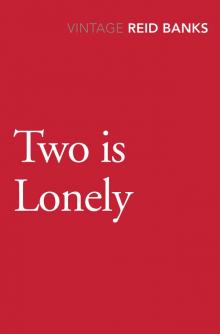 Two Is Lonely
Two Is Lonely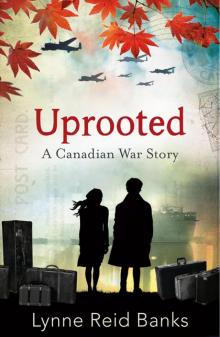 Uprooted - a Canadian War Story
Uprooted - a Canadian War Story The Backward Shadow
The Backward Shadow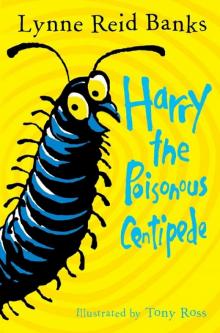 Harry the Poisonous Centipede: A Story to Make You Squirm
Harry the Poisonous Centipede: A Story to Make You Squirm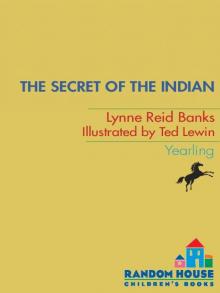 The Secret of the Indian (The Indian in the Cupboard)
The Secret of the Indian (The Indian in the Cupboard)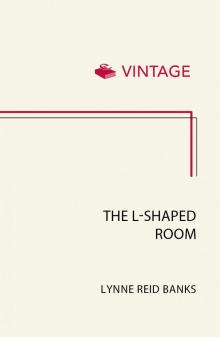 The L-Shaped Room
The L-Shaped Room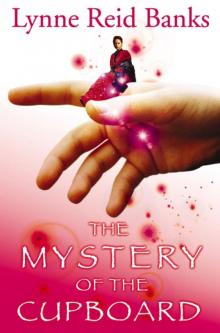 The Mystery of the Cupboard
The Mystery of the Cupboard The Farthest-Away Mountain
The Farthest-Away Mountain Harry the Poisonous Centipede Goes to Sea
Harry the Poisonous Centipede Goes to Sea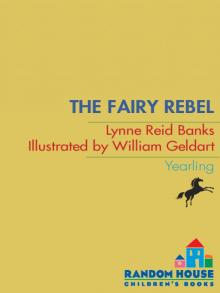 The Fairy Rebel
The Fairy Rebel Harry the Poisonous Centipede's Big Adventure: Another Story to Make You Squirm
Harry the Poisonous Centipede's Big Adventure: Another Story to Make You Squirm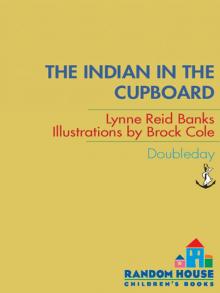 The Indian in the Cupboard
The Indian in the Cupboard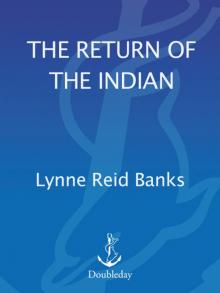 The Return of the Indian
The Return of the Indian I, Houdini
I, Houdini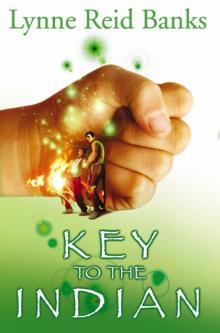 The Key to the Indian
The Key to the Indian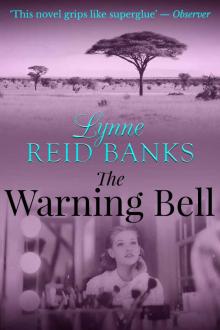 The Warning Bell
The Warning Bell Alice by Accident
Alice by Accident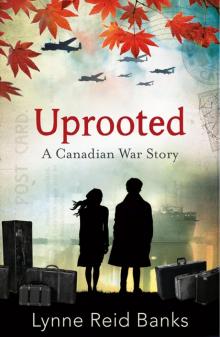 Uprooted
Uprooted Writing On the Wall
Writing On the Wall The Adventures of King Midas (Red Storybook)
The Adventures of King Midas (Red Storybook) Harry the Poisonous Centipede's Big Adventure
Harry the Poisonous Centipede's Big Adventure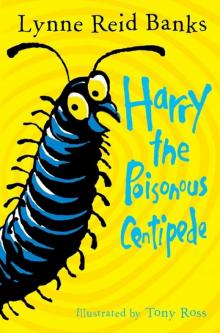 Harry the Poisonous Centipede
Harry the Poisonous Centipede The Dungeon
The Dungeon Bad Cat, Good Cat
Bad Cat, Good Cat The Indian in the Cupboard (Essential Modern Classics, Book 1)
The Indian in the Cupboard (Essential Modern Classics, Book 1) Tiger, Tiger
Tiger, Tiger